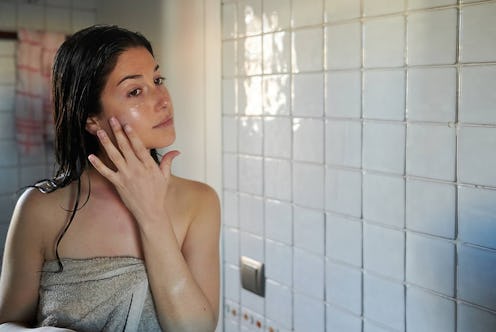Style
This Super Smart Beauty Gadget Uses Tech To Make Sure You Aren't Wasting Product

We all know the beauty industry is booming. With the influx of beauty YouTube stars and Instagrammers in recent years, makeup, skincare, and fragrances have been flying off the shelves faster than ever before. So it comes as no surprise that those looking in from the outside want to get involved with what's going on in this flourishing industry. In fact, biomedical engineer Dr David Heath just made the transition from science to beauty by designing a new creation that is set to take beauty by storm. But what is CutiTron, Heath's new tech-driven beauty device?
As the BBC reports, Heath recently arrived in Paris to unveil a prototype of a product he thinks could revolutionise the way we use beauty products. Heath has developed a device, the CutiTron, which tells people how much beauty product they need to use by analysing their skin. The app-based device was developed while Heath was working at Strathclyde University in Glasgow and conducted a study into how drugs can be delivered through the skin.
The CutiTron (founded by Heath's company Cutitronics) monitors the skin's hydration, the BBC states, and uses information such as a customer's location and temperature to suggest how much product they should be using. According to the BBC, Heath has claimed that the device can be "tailored to any brand and provide advice to customers whether at home or lying on a beach."
It sounds as though, at first, Heath didn't really realise how impactful his device could be in the cosmetics industry. He told BBC Radio's Good Morning Scotland:
"I presented at a skincare conference that I thought was more the medical side and it turned out it was more on the cosmetic side. I was surprised to see the size that the industry was. I saw some of the challenges they were having and I realised they were trying to address those challenges with chemistry. They hadn't really considered the power that engineering devices and digital technology bring."
Heath also revealed that he was initially surprised at the level of science used in beauty, and had to do his research at first, telling Good Morning Scotland:
"One of the areas I really had to look into for my own confidence moving into this industry was to understand how much of this is based on science and how much is based on marketing spin. I'm quite a cynical scientist, as I've been told quite regularly."
His device will be shown in at the In-Cosmetics Global trade show in Paris. The show allows suppliers to display their latest inventions in personal care and cosmetics to visiting manufacturers. It also allows those visiting to learn about the latest innovations and upcoming trends in beauty.
This development is the latest in a long stream of devices and products that offer beauty fans a real sense of personalisation. No longer content with buying generic product over the counter, many of us long for makeup and skincare that has been formulated specifically for us. From fragrance profiling at brands such as Penhaligons to being able to make your own bespoke lipstick at Code 8, personalisation is at the forefront of the beauty industry.
This article was originally published on